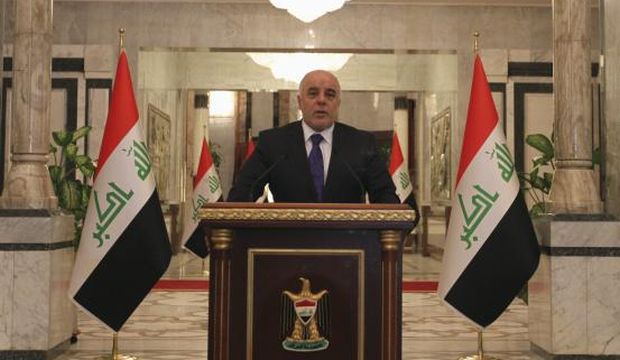
Iraq’s Prime Minister-designate Haider Al-Abadi speaks during a news conference in Baghdad on August 25, 2014. (Reuters/Mahmoud Raouf Mahmoud)
Baghdad, Asharq Al-Awsat—Talks between the Sunni Iraqi Forces Alliance and the Shi’ite National Alliance on the formation of a new Iraqi government led by Prime Minister-designate Haider Al-Abadi collapsed on Saturday.
Salman Al-Jumaili, head of the Sunni delegation at the negotiations, blamed members of the National Alliance for the collapse of the talks, accusing them of being uncooperative.
He said: “The talks with the National Alliance collapsed because of the insistence by some parties within the National Alliance on the old methods in dealing with political partners.”
Issam Obaid, a leading figure in the Iraqi Forces Alliance, told Asharq Al-Awsat: “The problem we face is that some members of the National Alliance, especially members of the State of Law coalition led by outgoing Prime Minister Nuri Al-Maliki, refuse to give any assurances related to our demands and rights.”
Obaid said the Iraqi Forces Alliance had sought to agree on the contents of the government’s political program before discussing the names of candidates for government posts, in contrast to its negotiating partners.
His claims were denied by the National Alliance, which said it had prepared a program for the government of Prime Minister-designate Abadi.
A statement by the office of the head of the National Alliance, Ibrahim Al-Jaafari, said a government program had been agreed and would be presented to the other parties in order to form a new government by September 11.
According to a political source close to the talks who spoke to Asharq Al-Awsat on condition of anonymity, negotiations between the National Alliance and the Kurdistan Alliance had proven to be much smoother, because almost all Kurdish demands related to the constitution.
The same source claimed that Sunni parties involved in talks on forming a government had been using the threat of the Islamic State of Iraq and Syria (ISIS) as leverage in the negotiations, and had warned that if their demands were not met rebels within Iraq’s Sunni community would abandon the political process to join ISIS.
Meanwhile, members of Iraq’s religious and ethnic minorities criticized the delay in forming a new government.
The leader of the Iraqi Turkmen Front called for the swift formation of a new government on Saturday, and spoke out against the plight of the country’s religious and ethnic minorities and the domination of top political posts by Kurds and Sunni and Shi’ite Arabs.
Arshad Al-Salihi told Asharq Al-Awsat: “The Turkmen are not as small a minority as they are presented. They are the third-largest ethnic group in the country and, therefore, they should have a share in the [government].”
Salihi added that Iraq’s Turkmens proposed that the dispute between the other parties should be put aside and discussed at a later stage, in order to form a government as quickly as possible.

Trackbacks/Pingbacks